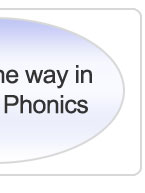Phonics Guidance during COVID-19
Sound Discovery is keen to support parents during the current Coronavirus (COVID-19) crisis. We have produced a Parent's Guide to Phonics (Guide for Parents) with advice, and links to resources.
Sound Discovery® Research Results
Government Policy Paper, 2021: The longitudinal studies by Grant M with Sound Discovery® (The Effects of a Systematic, Synthetic Phonics Programme on Reading, Writing and Spelling) are reported in the government, DfE policy paper which provides guidance for schools for the teaching of early reading: The reading framework: teaching the foundations of literacy, July 2021, p 15, Footnote 27, Grant M (2014). https://www.gov.uk/government/publications/the-reading-framework-teaching-the-foundations-of-literacy
Sound Discovery® is based on 11 years of longitudinal research. This research is backed up by achievements in a range of schools and by independent reports. https://www.syntheticphonics.net/reseach.php
Longitudinal Study from Reception to Year 2 (2010-2013) and Summary of an Earlier Longitudinal Study from Reception to Year 6 (1997-2004). The Effects of a Systematic, Synthetic Phonics Programme on Reading, Writing and Spelling, with whole classes of children who started with the programme for first-time teaching in Reception (aged four to five years) and received small group teaching with the same programme for catch-up as required.
The 2010-2013 longitudinal study on the effects of Sound Discovery® from Reception to Year 2 found that Year 2 children built on their flying start in Reception and Year 1. The aim of the study was to demonstrate how all children in a class can become fluent readers by the age of 7 years, and how disadvantaged children and struggling learners can overcome their difficulties to become confident, enthusiastic readers who love books. The whole Year 2 class were 28 months above chronological age for reading and 21 months ahead for spelling. Children in vulnerable groups made strong progress and no child achieved less than average reading or spelling for their age. Boys were the most impressive group at 36 months ahead for reading and 27 months ahead for spelling.
The 1997-2004 longitudinal study followed about 700 children who received first-time and catch-up teaching with Sound Discovery® to the end of Reception and through to the compulsory national tests for school pupils in England: Standardised Assessment Tests (SATs) at Key Stage 1 (KS1) and Key Stage 2 (KS2). The KS2 SATs results, at age 11 years, in 2004 showed that there were no severe literacy difficulties with this cohort of three classes of about 90 pupils. Of the children in this cohort 94% met national expectations for English and 65% achieved above national expectations, in contrast respectively with the national results for England of 77% (who met national expectations) and 26% (who achieved above national expectations). Hence the children in the study left primary school at the age of eleven years well equipped for the literacy demands of secondary education with virtually all of them having met nationally expected standards for English. It was particularly encouraging that vulnerable groups of children such as those from low-income and other disadvantaged families and children with learning difficulties were able to overcome their difficulties to achieve impressive results with literacy.
The results were reported in a paper delivered to the ResearchEd conference in London in 2014.
A copy of the full study can be downloaded from the Reading Reform Foundation website at the URL given below.
https://www.rrf.org.uk/pdf/Grant%20Follow-Up%20Studies%20-%20May%202014.pdf
See latest initiatives and products on the website front page. https://www.syntheticphonics.net/index.php


 Validated 2022
Validated 2022
